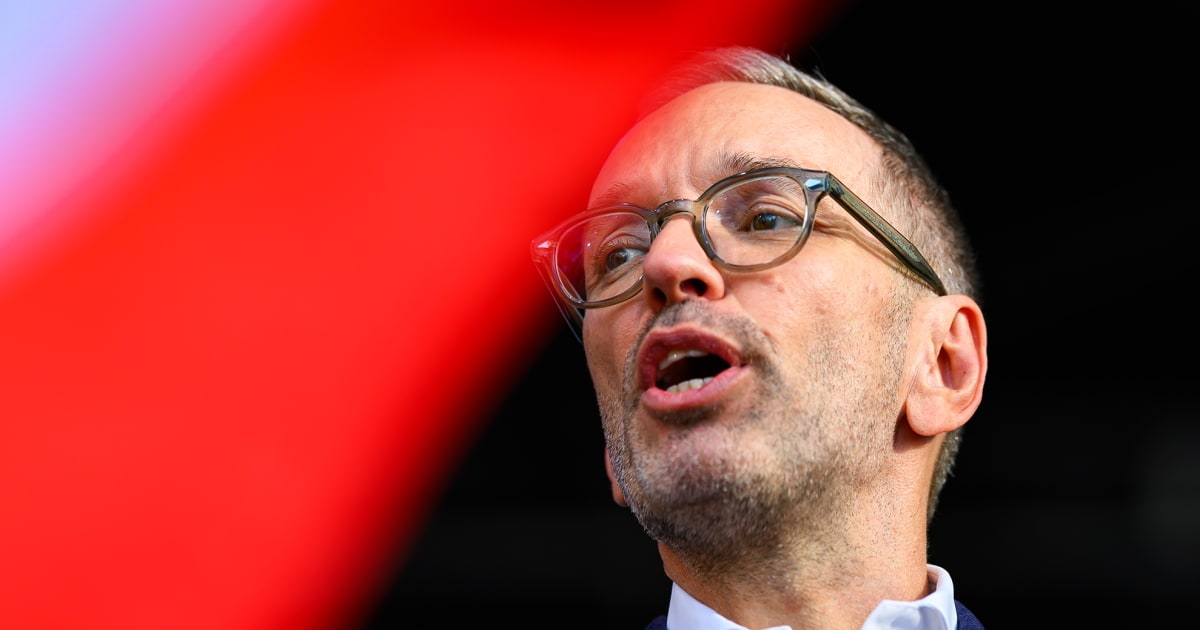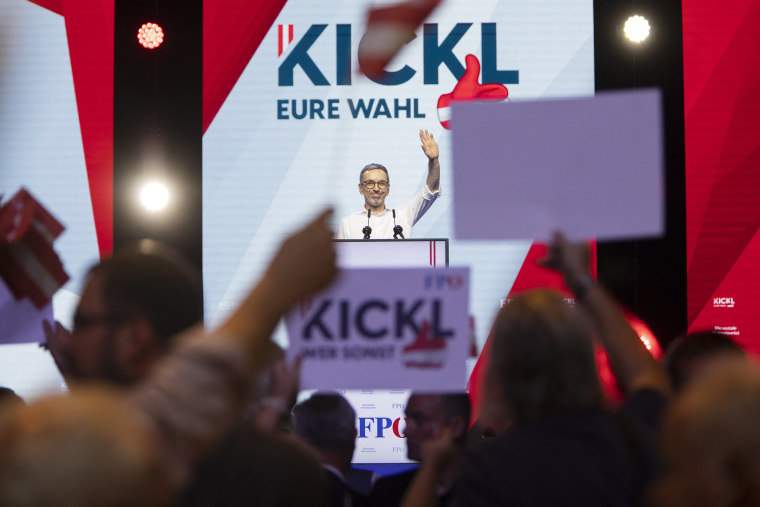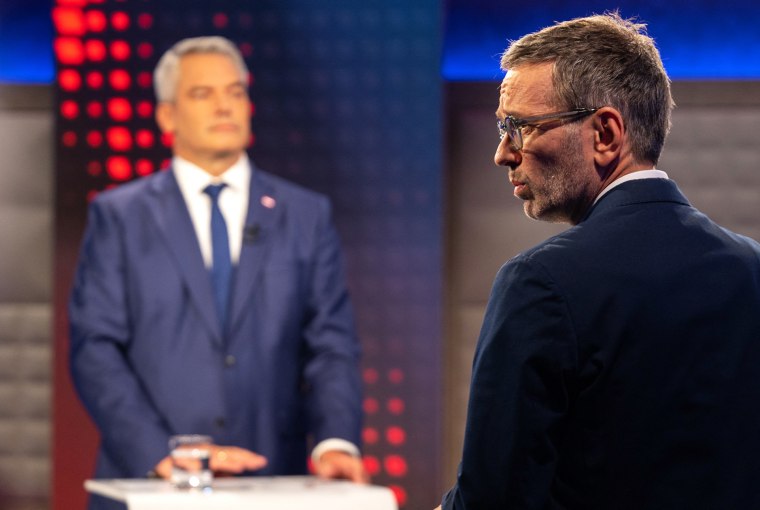
Politics in a central European country with a population of just 10 million may not seem important. But that is not the case in Austria, where there is a good chance that a pro-Russian far-right party, founded by former Nazis, will win Sunday’s election.
A win for the Freedom Party, or FPÖ, would not only have historical implications — Austria was the birthplace of Adolf Hitler — but could tip the balance of power between Russia and the West.
Despite its small size, Austria has for centuries enjoyed great influence as a crossroads in the heart of Europe. Its neutral status, being neither formally allied with NATO nor Russia, means that for centuries it has served as an arena for politicians, diplomats and spies trying to tilt the geopolitical balance.
So not only are opponents criticizing the FPÖ as xenophobic and racist, some Western onlookers are also concerned about its staunch opposition to supporting Ukraine against Moscow. Although Austria is a member of the European Union, its far-right party, which tops opinion polls, has strong ties to Russian President Vladimir Putin – the bloc’s arch enemy.
The Freedom Party seeks to form “an axis of far-right actors in the European Union,” according to Peter Felzmaier, a professor at the Universities of Kirms and Graz in Austria, and one of the country’s leading political commentators. He said that even if the party failed to form a coalition government – with all other major groups refusing to work with it – it would be a “symbolic” victory for the movement.
The FPÖ is led by Herbert Kickl, 55, a lanky, acerbic agitator who wears custom-made glasses.
His party called him “Volkskanzler” or “People’s Chancellor”, the term most closely associated with the Nazis who used it to describe Hitler. In fact, the Freedom Party of Austria was founded in the 1950s by former members of Hitter’s paramilitary group, the SS, although Kickl and his supporters reject comparison with modern times.
Whatever the intention, these populist undertones will be familiar in American politics, or indeed in Europe and much of the democratic world.

Kickl exploited the migration crisis in Europe, as hundreds of thousands of people fled war, poverty and natural disasters in the Middle East, North Africa and beyond. Migrants have become a source of frustrations exacerbated by the continent’s inflation and cost of living crisis.
Kickl’s vision is to build “Fortress Austria” and “Fortress Europe,” he said during a debate on Austrian public television Thursday night.
This will involve radically reforming Austria’s immigration system, registering all new arrivals and detaining them in specialized facilities. The party also proposes introducing “re-immigration” of “undesirable strangers” – that is, deporting migrants to their countries of origin.
All this is in the service of restoring “the cultural identity and social peace of our homeland,” says the Freedom Party’s manifesto, which calls for Austria to be a place of “homogeneity” rather than “diversity.” During Thursday’s debate, Kickel portrayed immigration as a “huge security issue, because we are bringing Islamization into the country.”
All of this has caused widespread terror across the political spectrum, with opponents describing these policies as xenophobic, racist and Islamophobic. Jewish commentators also accuse the party of using anti-Semitic tropes Opinion article in Thursday’s Jerusalem Post He described Kickel as a “neo-Nazi” who performs “stunts” to avoid Austria’s strict laws against anti-Semitism.
Austria’s current leader, Karl Nehammer, of the rival conservative Austrian People’s Party, has described Kickl as a “right-wing extremist.” “I think you are very dangerous,” Andreas Babler, leader of the left-wing Social Democratic Party, told Keckl during a television debate last week.

The FPÖ did not respond to NBC News’ request for an interview or comment in response to these criticisms.
For Gabriela Bacher, an Austrian-American film producer and political activist, there are underlying similarities between her homeland and former US President Donald Trump.
“After four years of Trump and MAGAism, I came back here and realized it’s actually not better,” she told NBC News. “It’s the same right-wing, populist attempt to try to incite people with fear mongering and hate speech and hatred.”
In her opinion, the FPÖ wants nothing less than “the restructuring of the Austrian Republic,” and to use “very fascist language” reminiscent of the “1920s and 1930s” – when the Nazis came to power.
Others worry that the FPÖ’s influence may extend beyond its borders.
For years, it has been sympathetic to Russia, not only calling for an end to European support for Ukraine, but also calling for an end to the sanctions imposed on Russia because of its war. In 2016, party leader Heinz-Christian Strache signed a formal “cooperation agreement” with Putin’s United Russia party. A year later, Foreign Minister-designate Karin Kneissl danced with Putin at her wedding.
He had been a junior coalition partner before, but collapsed in 2019 after Strache was secretly recorded offering to fix government contracts with a woman pretending to be a relative of a Russian oligarch.
A year earlier, NBC News went to the Austrian capital, Vienna, and spoke with security experts who expressed alarm at the party’s ties to Putin. These analysts have publicly expressed concern that the presence of the FPÖ in the EU government could lead to Western secrets being leaked to Moscow.
This time, Austria, led by the Freedom Party of Austria, could form a Ukraine-skeptical bloc with like-minded neighbours, Slovakia and Hungary, led by Trump ally Viktor Orban, who proudly describes his nation as an “illiberal democracy.” Her election will be the latest chapter in a right-wing trend across Europe, as voters reject mainstream centrists not only over immigration and the economy, but also over the environment and so-called “culture war” issues.
The FPÖ’s comeback is by no means certain, as its support rating currently stands at 27%, narrowly ahead of the ruling Austrian People’s Party, which has 25%, and the Social Democratic Party of Austria, which has 21%, according to European polling aggregator PolitPro. A coalition is almost certain – no easy task when the FPÖ is so badly vilified by opponents.
Film producer Bacher belongs to an organization called Promise for the Republic, which is trying to make it more difficult, asking Austrian politicians to rule out cooperation.
“This is really the republic that is at stake here,” she said.

“Travel specialist. Typical social media scholar. Friend of animals everywhere. Freelance zombie ninja. Twitter buff.”





More Stories
Taiwan is preparing to face strong Typhoon Kung-ri
Israel orders residents of Baalbek, eastern Lebanon, to evacuate
Zelensky: North Korean forces are pushing the war with Russia “beyond the borders”